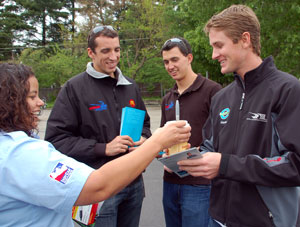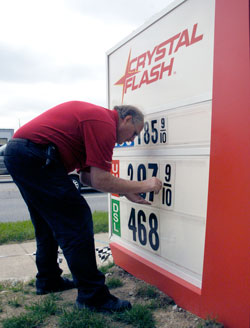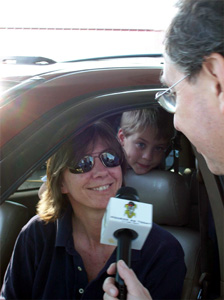 A man entrenched in the oil business is looking to the wind for the future.
A man entrenched in the oil business is looking to the wind for the future.
This story from Engadget.com says billionaire oilman T. Boone Pickens is investing $2 billion in a 667 turbine wind farm in Texas:
That would translate to roughly 1,000 megawatts of electricity, or enough to power about 300,000 homes, but Pickens says that is only the start of what he has in mind. As he tells CNN, Pickens says he plans to expand the wind farm to a full 4,000 megawatts by 2015, which would likely make it the biggest wind farm in the world. What’s more, in addition to pumping out electricity, the wind turbines would give a boost to the pocketbooks of anyone willing to put ’em on their property, with Pickens estimating that each turbine will generate about $20,000 a year in royalty income, although they apparently won’t get electricity straight from the turbine in their backyard.


 Teams participating in Challenge X, a multi-year engineering competition with 17 university teams from across North America developing GM vehicles, is getting ready to pull into the nation’s capital.
Teams participating in Challenge X, a multi-year engineering competition with 17 university teams from across North America developing GM vehicles, is getting ready to pull into the nation’s capital.
 Newbie IndyCar Driver Justin Wilson (pictured 2nd from left) says race car drivers want to go as fast as technology will let them. He says ethanol helps IndyCars do just that. Justin is referring to the smaller tank size and the improved torque when burning 100 percent ethanol fuel. When the IndyCars operated on methanol just a few years ago, the gas tanks held 34 gallons. But now, drivers see the same kind of mileage while burning just 22 gallons of ethanol. Justin says that amounts to extra performance and higher speeds.
Newbie IndyCar Driver Justin Wilson (pictured 2nd from left) says race car drivers want to go as fast as technology will let them. He says ethanol helps IndyCars do just that. Justin is referring to the smaller tank size and the improved torque when burning 100 percent ethanol fuel. When the IndyCars operated on methanol just a few years ago, the gas tanks held 34 gallons. But now, drivers see the same kind of mileage while burning just 22 gallons of ethanol. Justin says that amounts to extra performance and higher speeds. Wind power builder National Wind Assessments is putting up a major project in Nebraska.
Wind power builder National Wind Assessments is putting up a major project in Nebraska. ,A new fuel made by mixing natural gas and hydrogen is gaining in popularity.
,A new fuel made by mixing natural gas and hydrogen is gaining in popularity.  …sweet-smelling that is. Graham Rahal, driver of the No. 06 Newman/Haas/Lanigan Dallara was one of three IndyCar drivers at the Crystal Flash pump promotion in Carmel, IN this afternoon. The
…sweet-smelling that is. Graham Rahal, driver of the No. 06 Newman/Haas/Lanigan Dallara was one of three IndyCar drivers at the Crystal Flash pump promotion in Carmel, IN this afternoon. The  Team Ethanol Driver Ryan Hunter-Reay says pump promotions help emphasize what ethanol is all about: giving consumers a break at the pump as fuel prices continue to spike. Ryan drives the No. 17
Team Ethanol Driver Ryan Hunter-Reay says pump promotions help emphasize what ethanol is all about: giving consumers a break at the pump as fuel prices continue to spike. Ryan drives the No. 17  It was a record-breaking event for the
It was a record-breaking event for the  The author of “
The author of “ In his book, Dr. Robert Zubrin shows how we could be using fuel dollars that are now being sent to countries with ties to terrorism to help farmers here and abroad. As the FEW keynote speaker, Zubrin will offer his vision of how switching to alcohol fuels could help safeguard homeland security and provide solutions for global warming and Third World development.
In his book, Dr. Robert Zubrin shows how we could be using fuel dollars that are now being sent to countries with ties to terrorism to help farmers here and abroad. As the FEW keynote speaker, Zubrin will offer his vision of how switching to alcohol fuels could help safeguard homeland security and provide solutions for global warming and Third World development. This week is the biggest week of the year for Hoosiers in Indianapolis with the 92nd Indy 500 coming up and since it is also the second year that the race will be running on 100 percent fuel grade ethanol, it’s a big week for the corn and ethanol industries in the state.
This week is the biggest week of the year for Hoosiers in Indianapolis with the 92nd Indy 500 coming up and since it is also the second year that the race will be running on 100 percent fuel grade ethanol, it’s a big week for the corn and ethanol industries in the state. Indiana’s
Indiana’s